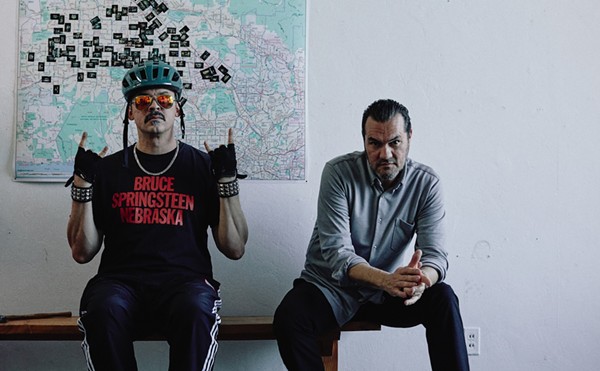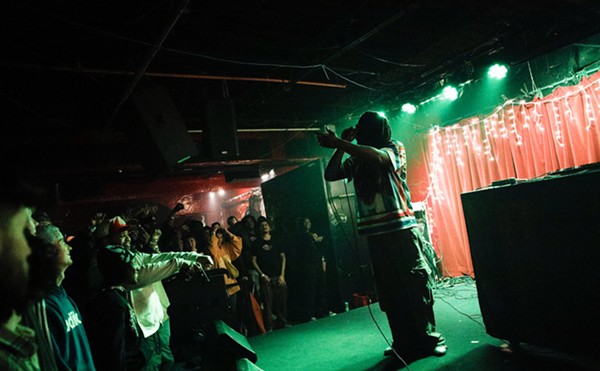Ultravox singer Midge Ure can't quite remember when he last played Cleveland.
"I was taking a break from Ultravox and I did a solo tour," he says via phone. "In fact, I did two. I did one opening for [pop singer] Howard Jones and then I went back out and did a club tour and I think that was the last time I was in Cleveland."
That would have been years ago, but for Ure, who's currently promoting the release of Ultravox's new album, Brilliant, and his autobiography, If I Was (the title is also the name of one of his best-known songs), the motivation in touring is to reintroduce U.S. fans to his extensive musical past that stretches all the way back to the late '60s when he hadn't yet changed his name from James Ure and played with a variety of Scottish rock bands.
Looking back on it, Ure can joke about the events that led up to his unofficially changing his name from "Jim" to "Midge" when he joined the band Salvation in 1972. That group already had a "Jim" so his bandmates nicknamed him Midge.
"You must have seen that movie Animal House and it's like the scene when John Belushi gives the new interns or whatever they are new names," he says of the name change. "It was like that. It was thrust upon me. No, I didn't think it would last this long and yes, it will probably be written on my gravestone. "
Living in Glasgow, Ure and his bandmates played radio-friendly pop music. But they knew about the punk explosion happening in London and sensed a dramatic shift was on the way.
"London was the center of everything at the time," Ure says. "All the music was emanating from there. Although we weren't part of the movement, you would listen to the radio and hear late-night programs featuring these new bands — the Damned, the Clash and the Pistols. We were well aware of what was going on. We desperately wanted to be part of it. But I was in a successful band at the time. We were very much a pop pin-up band. The whole punk thing and the whole new wave thing was a million miles away from what we were doing, yet we were very aware of it."
In fact, Ure nearly joined the Sex Pistols, though he's not sure what role he would have played in the band. Bernie Rhodes, a guy who would go on to manage the Clash, approached him as he came out of a music store in Glasgow and asked him about joining the group.
"I don't know whether it was to sing or play guitar," Ure says of the invitation. "They never really asked me specifically. [Bernie's] friend sitting in the car around the corner was [Pistols manager] Malcolm McLaren. They talked to me about this band they were putting together and they talked about his shop and the clothing designs he was putting together and how he used to work with the New York Dolls. I thought, 'This is ludicrous. They don't know what I can do or if I can do anything and yet they wanted me to join the band because of how I looked.'"
By the late '70s, however, Ure moved to London where he started a band with former Sex Pistol Glen Matlock. When that group fizzled, he then reformed violinist Billy Currie's old band Ultravox, which had been on hiatus. With Ure as its frontman, the group had a hit right out of the gate with 1980's Vienna, an album that drew its influence from the German avant garde group Kraftwerk.
"We went against the grain," says Ure. "I know most bands think they do that but we did. We were using a mini Moog next to an electronic guitar next to an electronic fiddle. We were doing things as radical as punk was meant to be but we were doing it with modern technology and mixing it all up so we were making something that didn't have a template. There was no one prior to us doing that and having commercial success."
The title track, for example, was a four-minute long ballad that featured a mid-song viola solo.
"That was a huge, huge success for us and enabled us to play massive venues," says Ure when asked about the song. "But you couldn't have picked a more obscure, off-the-wall song to do it with. That epitomized what Ultravox was. We did what we thought was right without concern for whether it was commercially successful or not and success found us."
The group had a good run through the '80s when songs such as "Reap the Wild Wind" and "Dancing with Tears in My Eyes" received radio airplay. Ure's 1985 solo album, The Gift, would also yield one of his biggest hits: "If I Was," a moody synth-pop song that sounded similar to much of the material he had recorded with Ultravox. The tour in support of that album would mark the last time Ure was in the States for an extensive jaunt.
"The last time I was in America, I had lots of hair," he jokes. "These days, that's a problem I don't have to think about any more. I toured ten years ago doing an acoustic thing, but it was very low-key."
This tour, though it won't feature Ure with Ultravox, is in support of Brilliant, a new Ultravox album that came out last year. It features the kind of anthemic synth-pop tunes for which Ultravox was known. But for the U.S. tour, Ure will play with the American band Right the Stars.
"The idea being that it's to let people know that Ultravox is still breathing again and there's a new album," says Ure. "It's easier for me to come out and do this than to put Ultravox out there because it's an expensive toy to play with. Getting that band up and running is a logistical and technical nightmare."
Ure says he imagines the set will feature "a good selection of stuff," including both Ultravox songs and solo tunes.
"The odd part is that I haven't actually met the band yet," he says. "We've only talked on Skype. I'm sure they're capable of playing and are incredibly good musicians. The only way to make this work is to come out there and use an American band. That I'm looking forward to. I have to adapt the arrangements a bit because they're not a keyboard band. That to me is a challenge to figure out how to get the vastness of the song with guitars rather than synthesizers."
Ure has also had to adjust to a changing music industry.
"You cannot do things the way you used to be able to do it," he says. "You used to say, 'I'm going to America with Ultravox, thanks very much.' Of course, the record company would give you tour support. Not only does the tour support not exist anymore, but the record company doesn't exist any more. You have to look at it in a very different way if you want to keep the thing rolling. Live performance is incredibly important. There's a generation growing up now that thinks live performance is something you do on a reality TV show and that's the route to success. Not really. The next John Lennon or the next Bob Marley or the next Peter Gabriel isn't going to come up through that route. But they're out there and the only way you're going to find them is by going to a little club and seeing them perform live and following them."











